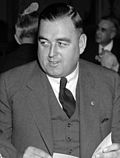Election
Term of office
The treasurer is elected by the people on Election Day in November to four-year terms, and takes office on the third Wednesday of the January following a general election. There is no limit to the number of terms a treasurer may hold. [2] Institutionally speaking, the treasurer is thus independent of both the governor and General Court for the purpose of performing their official duties. These constitutional protections notwithstanding, the treasurer may still be impeached for misconduct or maladministration by the House of Representatives and, if found guilty, removed from office by the Senate. [3]
Qualifications
Any person seeking election to the office of treasurer must meet the following requirements:
- Be at least eighteen years of age;
- Be a registered voter in Massachusetts;
- Be a Massachusetts resident for at least five years when elected; and
- Receive 5,000 signatures from registered voters on nomination papers. [4]
Vacancies
In the event of a vacancy in the office of treasurer, the General Court is charged, if in session, with electing from among the eligible citizens of the Commonwealth a successor to serve the balance of the prior treasurer's term in office. [b] If, however, the vacancy occurs while the General Court is not in session, then responsibility for appointing a successor falls to the governor. The appointment is not valid without the advice and consent of the Governor's Council. [7]
Powers and duties
The state treasurer is in effect the chief financial officer for the Commonwealth of Massachusetts. [8] As such, the state treasurer manages the Commonwealth's cash flows and invests the working capital of state agencies and local governments. [9] The state treasurer is also responsible for issueing, registering, and servicing the Commonwealth's public debt along with administering escheats and unclaimed property that accrue to the Commonwealth. [10] [11] These are core functions shared with other state treasurers. [12]
Other programs have been assigned to the state treasurer by law. For example, the state treasurer regulates the sale of alcoholic beverages within intrastate commerce, provides tax-advantaged ABLE and college savings programs to Bay Stater residents, and manages the state lottery. [13] [14] [15] Likewise, the state treasurer administers deferred compensation plans to public and nonprofit employees along with bonuses to veterans, servicemembers, and military families domiciled in Massachusetts. [16] [17]
Aside from these functional responsibilities, the state treasurer is ex officio chair of the Massachusetts Clean Water Trust, the Massachusetts School Building Authority, the Massachusetts State Retirement Board, and the Pension Reserves Investment Management Board. [18] [19] [20] [21] These independent agencies are governed by multimember boards attached to the Office of the Treasurer and Receiver-General for administrative purposes.
This page is based on this
Wikipedia article Text is available under the
CC BY-SA 4.0 license; additional terms may apply.
Images, videos and audio are available under their respective licenses.































